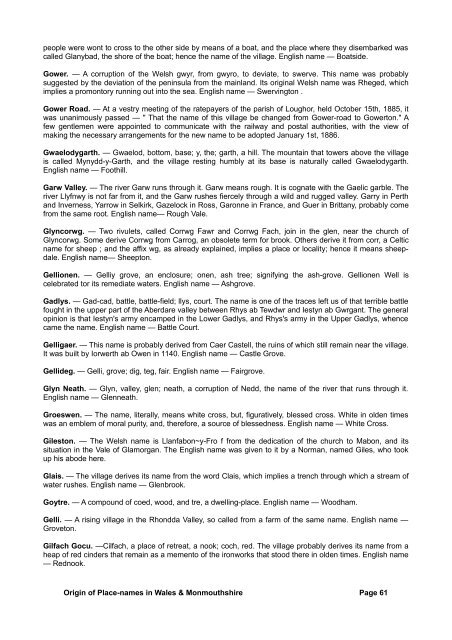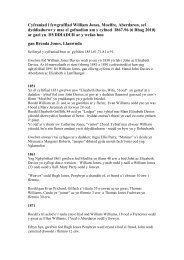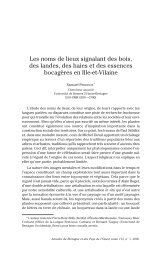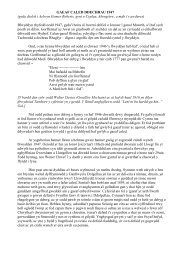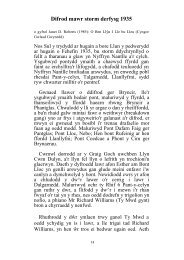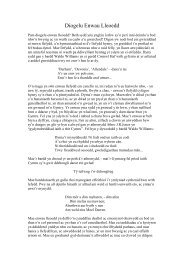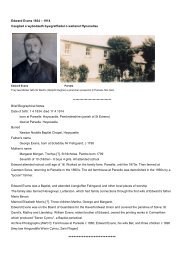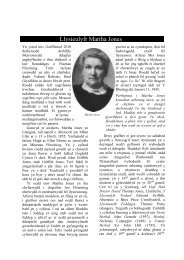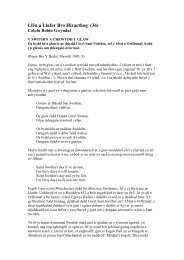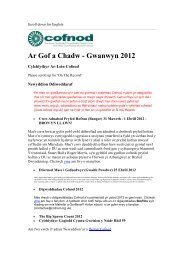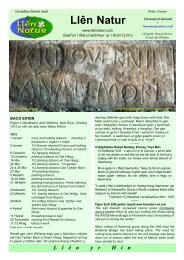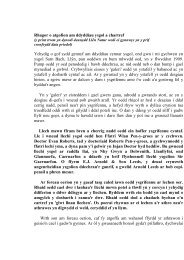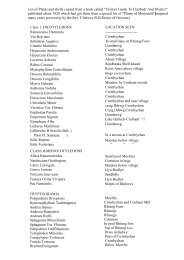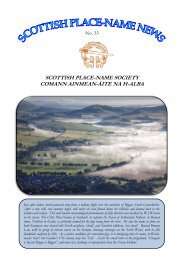people were wont to cross to <strong>the</strong> o<strong>the</strong>r side by means <strong>of</strong> a boat, <strong>and</strong> <strong>the</strong> <strong>place</strong> where <strong>the</strong>y disembarked wascalled Glanybad, <strong>the</strong> shore <strong>of</strong> <strong>the</strong> boat; hence <strong>the</strong> name <strong>of</strong> <strong>the</strong> village. English name — Boatside.Gower. — A corruption <strong>of</strong> <strong>the</strong> Welsh gwyr, from gwyro, to deviate, to swerve. This name was probablysuggested by <strong>the</strong> deviation <strong>of</strong> <strong>the</strong> pen<strong>in</strong>sula from <strong>the</strong> ma<strong>in</strong>l<strong>and</strong>. Its <strong>orig<strong>in</strong></strong>al Welsh name was Rheged, whichimplies a promontory runn<strong>in</strong>g out <strong>in</strong>to <strong>the</strong> sea. English name — Swerv<strong>in</strong>gton .Gower Road. — At a vestry meet<strong>in</strong>g <strong>of</strong> <strong>the</strong> ratepayers <strong>of</strong> <strong>the</strong> parish <strong>of</strong> Loughor, held October 15th, 1885, itwas unanimously passed — " That <strong>the</strong> name <strong>of</strong> this village be changed from Gower-road to Gowerton." Afew gentlemen were appo<strong>in</strong>ted to communicate with <strong>the</strong> railway <strong>and</strong> postal authorities, with <strong>the</strong> view <strong>of</strong>mak<strong>in</strong>g <strong>the</strong> necessary arrangements for <strong>the</strong> new name to be adopted January 1st, 1886.Gwaelodygarth. — Gwaelod, bottom, base; y, <strong>the</strong>; garth, a hill. The mounta<strong>in</strong> that towers above <strong>the</strong> villageis called Mynydd-y-Garth, <strong>and</strong> <strong>the</strong> village rest<strong>in</strong>g humbly at its base is naturally called Gwaelodygarth.English name — Foothill.Garw Valley. — The river Garw runs through it. Garw means rough. It is cognate with <strong>the</strong> Gaelic garble. Theriver Llyfnwy is not far from it, <strong>and</strong> <strong>the</strong> Garw rushes fiercely through a wild <strong>and</strong> rugged valley. Garry <strong>in</strong> Perth<strong>and</strong> Inverness, Yarrow <strong>in</strong> Selkirk, Gazelock <strong>in</strong> Ross, Garonne <strong>in</strong> France, <strong>and</strong> Guer <strong>in</strong> Brittany, probably comefrom <strong>the</strong> same root. English name— Rough Vale.Glyncorwg. — Two rivulets, called Corrwg Fawr <strong>and</strong> Corrwg Fach, jo<strong>in</strong> <strong>in</strong> <strong>the</strong> glen, near <strong>the</strong> church <strong>of</strong>Glyncorwg. Some derive Corrwg from Carrog, an obsolete term for brook. O<strong>the</strong>rs derive it from corr, a Celticname for sheep ; <strong>and</strong> <strong>the</strong> affix wg, as already expla<strong>in</strong>ed, implies a <strong>place</strong> or locality; hence it means sheepdale.English name— Sheepton.Gellionen. — Gelliy grove, an enclosure; onen, ash tree; signify<strong>in</strong>g <strong>the</strong> ash-grove. Gellionen Well iscelebrated tor its remediate waters. English name — Ashgrove.Gadlys. — Gad-cad, battle, battle-field; llys, court. The name is one <strong>of</strong> <strong>the</strong> traces left us <strong>of</strong> that terrible battlefought <strong>in</strong> <strong>the</strong> upper part <strong>of</strong> <strong>the</strong> Aberdare valley between Rhys ab Tewdwr <strong>and</strong> Iestyn ab Gwrgant. The generalop<strong>in</strong>ion is that Iestyn's army encamped <strong>in</strong> <strong>the</strong> Lower Gadlys, <strong>and</strong> Rhys's army <strong>in</strong> <strong>the</strong> Upper Gadlys, whencecame <strong>the</strong> name. English name — Battle Court.Gelligaer. — This name is probably derived from Caer Castell, <strong>the</strong> ru<strong>in</strong>s <strong>of</strong> which still rema<strong>in</strong> near <strong>the</strong> village.It was built by Iorwerth ab Owen <strong>in</strong> 1140. English name — Castle Grove.Gellideg. — Gelli, grove; dig, teg, fair. English name — Fairgrove.Glyn Neath. — Glyn, valley, glen; neath, a corruption <strong>of</strong> Nedd, <strong>the</strong> name <strong>of</strong> <strong>the</strong> river that runs through it.English name — Glenneath.Groeswen. — The name, literally, means white cross, but, figuratively, blessed cross. White <strong>in</strong> olden timeswas an emblem <strong>of</strong> moral purity, <strong>and</strong>, <strong>the</strong>refore, a source <strong>of</strong> blessedness. English name — White Cross.Gileston. — The Welsh name is Llanfabon~y-Fro f from <strong>the</strong> dedication <strong>of</strong> <strong>the</strong> church to Mabon, <strong>and</strong> itssituation <strong>in</strong> <strong>the</strong> Vale <strong>of</strong> Glamorgan. The English name was given to it by a Norman, named Giles, who tookup his abode here.Glais. — The village derives its name from <strong>the</strong> word Clais, which implies a trench through which a stream <strong>of</strong>water rushes. English name — Glenbrook.Goytre. — A compound <strong>of</strong> coed, wood, <strong>and</strong> tre, a dwell<strong>in</strong>g-<strong>place</strong>. English name — Woodham.Gelli. — A ris<strong>in</strong>g village <strong>in</strong> <strong>the</strong> Rhondda Valley, so called from a farm <strong>of</strong> <strong>the</strong> same name. English name —Groveton.Gilfach Gocu. —Cilfach, a <strong>place</strong> <strong>of</strong> retreat, a nook; coch, red. The village probably derives its name from aheap <strong>of</strong> red c<strong>in</strong>ders that rema<strong>in</strong> as a memento <strong>of</strong> <strong>the</strong> ironworks that stood <strong>the</strong>re <strong>in</strong> olden times. English name— Rednook.Orig<strong>in</strong> <strong>of</strong> Place-<strong>names</strong> <strong>in</strong> Wales & Monmouthshire Page 61
Gwarycaeau. — Gwdr, <strong>the</strong> nape <strong>of</strong> <strong>the</strong> neck; y y <strong>the</strong>; caeau, fields; signify<strong>in</strong>g a <strong>place</strong> situated <strong>in</strong> <strong>the</strong> upperpart <strong>of</strong>, or above, certa<strong>in</strong> hilly fields. English name — Highfield.Hirwaun. - The name signifies long meadow. The correct name is Hirwaun Gwrgant, Gwrgan's longmeadow, or mounta<strong>in</strong>-pla<strong>in</strong>. It appears that this meadow <strong>in</strong> olden times extended from Blaengwrach, nearRhydgroes, to Mounta<strong>in</strong> Ash, <strong>and</strong> so it was nearly ten miles long; but <strong>in</strong> <strong>the</strong> eleventh century, Gwrgan ab l<strong>the</strong>lgave a portion <strong>of</strong> it, called Y Waun Hir, <strong>the</strong> long meadow, scot free; to his poor subjects <strong>and</strong> all o<strong>the</strong>rWelshmen for rais<strong>in</strong>g corn, <strong>and</strong> breed<strong>in</strong>g sheep <strong>and</strong> cattle. English name — Long Meadow, or Longmoor.Heolyfel<strong>in</strong>. — Its English name is " Mill-street, " so called from <strong>the</strong> Llwydcoed mill that stood on <strong>the</strong> riverCynon. In 1792 <strong>the</strong> first houses <strong>of</strong> this populous <strong>place</strong> were built by a Morgan Watk<strong>in</strong>. It is also calledTrecynon from its situation on <strong>the</strong> bank <strong>of</strong> <strong>the</strong> Cynon. Cynon is a compound <strong>of</strong> cyn, chief, <strong>and</strong> a<strong>in</strong>, water orrunn<strong>in</strong>g brook ; signify<strong>in</strong>g <strong>the</strong> chief brook.Hafod. — The name means a summer-house, <strong>in</strong> contra-dist<strong>in</strong>ction from Gauafod, w<strong>in</strong>ter-house. The villagederived its name from a farmhouse <strong>of</strong> <strong>the</strong> same name. English name— Solham, or Summerham.Hendre. — A compound <strong>of</strong> hen, old, <strong>and</strong> tref, a dwell<strong>in</strong>g. In times <strong>of</strong> yore, <strong>the</strong> people took up <strong>the</strong>ir abode for<strong>the</strong> w<strong>in</strong>ter <strong>in</strong> <strong>the</strong> valleys, <strong>and</strong> <strong>the</strong>se homesteads were called Hendref, <strong>in</strong> contradist<strong>in</strong>ction from Hafod, whichwas only a temporary residence. English name— Oldham.'???3N. — II is an abbreviation <strong>of</strong> Illtyd, or Iltutus, it signify<strong>in</strong>g Illtyd's town. The Welsh name Illtyd. Thechurch here was probably dedicated to Illtyd, a descendant <strong>of</strong> Emyr Llydaw, <strong>and</strong> a sa<strong>in</strong>t <strong>of</strong> <strong>the</strong> sixth <strong>the</strong>century.Cilfray. — An Anglicized form <strong>of</strong> Cilfai; cil, a <strong>place</strong> t; fai-mai, a pla<strong>in</strong>. The name signifies a ed <strong>place</strong>. Englishname — Hidham.??ifabon. — The church was dedicated to Mabon, bro<strong>the</strong>r, who founded it <strong>in</strong> <strong>the</strong> sixth century, it is derivedfrom Itnapos, <strong>in</strong> Old Welsh map y now <strong>in</strong> <strong>the</strong> church is <strong>the</strong> name <strong>of</strong>, a youth, a son. English name —Boychurch.Lewiston. — So called <strong>in</strong> honour <strong>of</strong> W. Lewis, Lewitnewydd House, on whose estate <strong>the</strong> village st<strong>and</strong>s.Caegynwyd. — The church was dedicated to sa<strong>in</strong>t <strong>of</strong> <strong>the</strong> sixth century. Cynwyd signifies evil or mischief.Gwlaw cynwyd, a destructive force. - English name — Primechurch.Gyfelach. — Cyfelach, bishop <strong>of</strong> Ll<strong>and</strong>aff <strong>in</strong> first century, is supposed to have founded <strong>the</strong> church here,which was dedicated to him. Cyfelach resembl<strong>in</strong>g his ancestors. English name — ????Llanblethian. — The ancient church was dedicated to n or Bleddyn, a contemporary <strong>of</strong> Garmon, who,founded it <strong>in</strong> <strong>the</strong> sixth century. Bleddyn means wolf-child. English name — Wolfton.Ll<strong>and</strong>ough. — The church was dedicated to Dochwy, a Dom<strong>in</strong>ican sa<strong>in</strong>t, who founded a sem<strong>in</strong>ary here <strong>in</strong><strong>the</strong> first century. The Welsh name, Ll<strong>and</strong>ochwy, is transcribed <strong>in</strong>to Ll<strong>and</strong>ough. Dochwy is probably aderivative <strong>of</strong> tawch-wy, <strong>the</strong> hazy water. English name— ??????Llanilltyd Faerdref. — The church is dedicated to Faerdref, a dairy hamlet. The Welsh pr<strong>in</strong>ces men keptdairy-houses at a little distance from <strong>the</strong> palaces <strong>and</strong> courts. Two farmsteads <strong>in</strong> <strong>the</strong> neighbourhood still reta<strong>in</strong><strong>the</strong> <strong>names</strong> <strong>of</strong> Faerdref Fawft ~ be<strong>in</strong>g <strong>of</strong> or near <strong>the</strong> site <strong>of</strong> one <strong>of</strong> <strong>the</strong>se dairy-houses; hence <strong>the</strong> name.English name — Dairychurch.L<strong>and</strong>ore. — From <strong>the</strong> Welsh Gl<strong>and</strong>wr, <strong>the</strong> name <strong>of</strong> an old farmstead situated near <strong>the</strong> river Tawy. Englishname — Waterton.Lantwit-Major. — A semi-translation <strong>of</strong> Llanilltyd Fawr. A religious sem<strong>in</strong>ary was founded here at a very earlyperiod, which, about <strong>the</strong> year 450, was renovated by Garmon, who, toge<strong>the</strong>r with Dyfrig, dedicated Illtyd tobe <strong>the</strong> head teacher <strong>the</strong>re<strong>of</strong>; hence it was called Car Illtyd, Bangor Illtyd, <strong>and</strong> Llanilltyd Fawr. The differentiafawr was added to dist<strong>in</strong>guish it as par excellence above every o<strong>the</strong>r <strong>in</strong>stitution bear<strong>in</strong>g <strong>the</strong> name Illtyd.English name — Illston Major.Orig<strong>in</strong> <strong>of</strong> Place-<strong>names</strong> <strong>in</strong> Wales & Monmouthshire Page 62
- Page 1 and 2:
HANDBOOK OF THE ORIGIN OF PLACE-NAM
- Page 3 and 4:
§ § § § §The Author begs to st
- Page 5 and 6:
pitiful cries of the railway offici
- Page 7 and 8:
Bishop Percy says that "in England,
- Page 9 and 10:
The city of Chester is still popula
- Page 11 and 12:
There's Cumwhitton, Cumwhinton, Cum
- Page 13 and 14: Llwyn in its primary' sense means a
- Page 15 and 16: PLACE-NAMES IN WALES.Wales. — The
- Page 17 and 18: Church are generally dedicated to e
- Page 19 and 20: think he was a contemporary of St.
- Page 21 and 22: Rhosbeirio. — Rhos, a moor, a dry
- Page 23 and 24: of Brecknock," states that this vic
- Page 25 and 26: Cam cnwir ef Cwmdu,Cwm gwyn yw & n
- Page 27 and 28: Penderyn. — A corruption probably
- Page 29 and 30: Ardudwy. — Ar, upon or above; tud
- Page 31 and 32: to mark its pre-eminence over the o
- Page 33 and 34: Some think that eirw is a corruptio
- Page 35 and 36: present form — Caerfyrddin.Abergw
- Page 37 and 38: place of refuge; hence the name. En
- Page 39 and 40: Llansawyl. — The church was dedic
- Page 41 and 42: eject. The village took its name fr
- Page 43 and 44: house, and attempted to kill an inf
- Page 45 and 46: Gwydir. — Prima facie one may tak
- Page 47 and 48: Nefyn. — The church was probably
- Page 49 and 50: DENBIGHSHIRE.Anglicized form of Din
- Page 51 and 52: Llangollen. — From Collen, a sain
- Page 53 and 54: hands into their pockets to pay a c
- Page 55 and 56: Cefn. — The name signifies a ridg
- Page 57 and 58: Maesgarmon. — Named in honour of
- Page 59 and 60: Abertridwr. — Tridwr, three water
- Page 61 and 62: it is said, was originally built by
- Page 63: Cwmllynfell. — Cwm, a narrow vale
- Page 67 and 68: means a cultivated region, a vale,
- Page 69 and 70: Penrhiwfer.- Pen, head, top; rhiw,
- Page 71 and 72: Port Talbot. — So called in 1835
- Page 73 and 74: Trealaw. — This appellation was g
- Page 75 and 76: Aberdyfi. — So called from its si
- Page 77 and 78: Llanddwywe. — From Dwywau, a desc
- Page 79 and 80: Crickhowell and some in the directi
- Page 81 and 82: Griffithstown. — This village was
- Page 83 and 84: and gwy, water. Treiddiod troth tna
- Page 85 and 86: derive Tintern from din, fortified
- Page 87 and 88: Caersws. — It appears that the Ro
- Page 89 and 90: English name — Ervylton.Llanymech
- Page 91 and 92: Angle. — Probably from the angle-
- Page 93 and 94: Gellyswick. — Another hybrid. Gel
- Page 95 and 96: that the two rivers in their flowin
- Page 97 and 98: ecame the bishop of the see, and wa
- Page 99 and 100: earth formerly stood on a summit on
- Page 101 and 102: Pilleth. — A corruption of pwll,
- Page 103 and 104: Howells, Rev. J., Mountain AshHowel
- Page 105 and 106: Williams, D., PenywernWilliams, Rev


